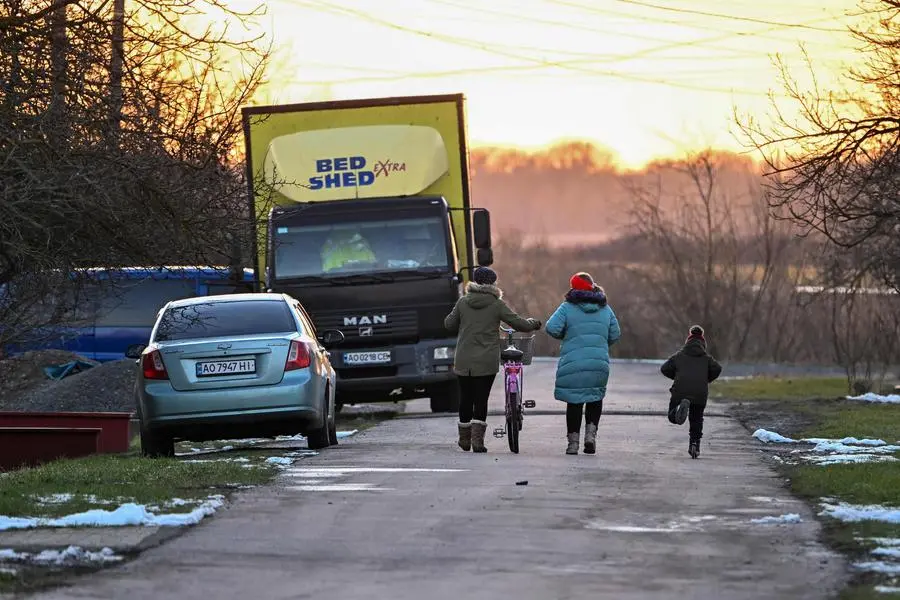PHOTO
In the village of Siurte in Ukraine's westernmost corner, home to a large Hungarian community, many fighting-age men say they are living in fear of being conscripted.
Ukrainian men over the age of 27 can be called up to the front to help defend the country from the Russian invasion.
"My husband doesn't dare to go out, go shopping or take the kids to school because he's afraid of being drafted," a local woman told AFP on condition of anonymity.
She hoped the war would soon end with a ceasefire, echoing the rhetoric of Hungarian Prime Minister Viktor Orban, who claims that Ukraine cannot win.
Jozsef, a man in his 40s who declined to give his surname, said he was extra cautious when driving to the nearby border city of Uzhhorod in case he was "taken to a drafting centre".
He said he tended to agree with Orban, who has cultivated close ties with Russian leader Vladimir Putin, and did not want to become a pawn in a conflict he has "nothing to do with".
"Some say the war is fought by the US against Russia through Ukraine," he added, echoing a narrative often peddled by Hungary's pro-government media.
Orban has also claimed that ethnic Hungarians are being forced into the Ukraine military and dying at the front in large numbers, without providing evidence.
The issue has become all the more sensitive with Kyiv pushing to drop the conscription age to 25 as the war drags on.
- Closer to Budapest -
More than 100,000 ethnic Hungarians live in the region of Transcarpathia that borders Poland, Slovakia, Hungary and Romania -- though many have fled to Hungary since the start of the war.
Part of the Austro-Hungarian empire until World War I, Transcarpathia is closer to Budapest than Kyiv.
According to local estimates, the population of Siurte alone has dwindled to about 1,000 from 4,000 before Moscow's invasion of Ukraine two years ago.
Those who have stayed largely get their news from government-controlled Hungarian media outlets dominated by Orban-friendly voices and narratives.
In large parts of the border region "only Hungarian public television can be received" said Laszlo Zubanics, the leader of the local Hungarian UMDSZ party.
In December he pleaded for EU membership negotiations to be opened with Ukraine in a letter drafted with other community representatives protesting Orban's perceived pro-Russian stance.
Orban is against membership talks with Ukraine and is the only EU leader who has maintained friendly relations with the Kremlin.
He also blocked vital EU aid for Kyiv before eventually giving in at an extraordinary summit in Brussels this month.
- 'Negative spiral' -
But hundreds of ethnic Hungarians are serving in the Ukrainian army, including Fedir Shandor, a university professor-turned-soldier who has been named the country's new ambassador to Budapest. He shot to fame by continuing to teach his students remotely from the trenches.
Zubanics said while large parts of the Budapest media regard the war "as something which does not concern Hungarians, it certainly does concern the Hungarian community in Transcarpathia.
"We cannot stay out of it... because we are part of it every day," he said.
Gabor Feher, editor of the Hungarian section of the Ukrainian public television channel Suspilne, said the division in Transcarpathia was palpable.
"Part of the Hungarian population is patriotic and defends their homeland" by serving in the Ukrainian army, Feher said.
"On the other hand... Viktor Orban is seen as a messiah by some," he added.
Since his return to power in 2010, the Hungarian leader has provided significant financial support to the Transcarpathia community and smoothed Hungarian citizenship requests.
Orban has also frequently criticised a law Kyiv passed in 2017 to promote the use of the Ukrainian language.
To assuage Hungarian concerns, Ukraine recently amended the legislation restoring some rights for national minorities, and promised to set up a special commission to look at the issue.
Hungarian Foreign Minister Peter Szijjarto hailed the changes as "certainly having stopped this negative spiral" after meeting his Ukrainian counterpart Dmytro Kuleba late last month.
Many in Transcarpathia hope their meeting will lead to a warming in the often bumpy relations between the two neighbours.





















